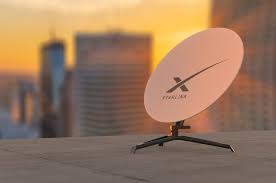SpaceX’s Starlink satellite internet service aims to bring fast internet to rural and underdeveloped areas worldwide, especially in Africa, where satellite networks and services are scarce.
The satellite network, which has more than 5,000 low Earth orbit (LEO) satellites, wants to change how people connect in Africa by providing fast, reliable, unrestricted internet access. This move could help close the digital gap by giving people who didn’t have access before high-speed internet access. It would also be perfect for the continent’s remote areas.
Starlink runs a massive network of low-earth orbit (LEO) satellites that let it provide internet access almost everywhere on Earth, even though it is pretty pricey. So, it can be used anywhere, even in small towns where internet access isn’t widespread.
Read also: Starlink to introduce direct-to-phone connection in 2024
Starlink’s business in Africa
Starlink is growing in Africa, which has become one of its most important areas. Its main goal is to serve every country on the continent with its internet service. It’s effortless to sign up for the services. To get Starlink, someone has to put a dish somewhere with a clear view of the sky.
Starlink has been available in or is expected to launch in more than twice as many African countries since December 2022, when it was first brought to the continent. It will only be able to enter African markets after getting governmental approvals from each country.
Starlink can now be used in seven African countries as of October 2023. Nigeria, Kenya, Mozambique, Rwanda, Malawi, and Zambia were some of the first countries to join the Starlink network. Benin is the newest member. For people in these countries, the Starlink website lets them place straight orders.
Also, 25 more African countries that didn’t know when they would be able to get Starlink before will get it by the end of 2024.
South Africa, on the other hand, is still not on the list of future availability. This might not have been included because of the Electronic Communications Act, which says that all South African telecom companies must have at least 30% of their shares owned by historically disadvantaged groups. Because of this, the country was marked as a low-priority market for the business.
Pricing and roaming for countries
Users can use global or regional roaming in places where Starlink’s service is not yet accessible by importing the appropriate kit from a country where it is. Starlink is available in roaming. However, it costs more than in the nation of registration.
The satellite network provider also offers customisable pricing based on budgets, needs, and currency PPP.
Customers usually need the Starlink Kit, which comprises a satellite dish and modem. Country and package options affect prices. Starlink also offers instalment options to spread equipment costs across several months.
The Nigerian satellite internet service just lowered its hardware prices. Starting in October, the Starlink kit, necessary for service access, was reduced by 21%, from ₦378,000 to ₦299,000. But the monthly subscription stayed at N38,000.
Countries and Estimated Availability Date
For a detailed analysis of Starlink’s standing in each of the 54 African nations recognised by the UN, please see the following:
Algeria(No Planned Launch Date), Angola (Q3 2024), Benin(Available), Botswana (Q3 2024), Burkina Faso( 2024), Burundi (Q2 2024), Cabo Verde (2024), Cameroon (2024), Central African Republic (No Launch Date), Comoros, Chad, Democratic Republic of Congo (2024).Djibouti 2024( No Launch Date Set), Egypt (2024 ), Eritrea( No Planned Launch Date), Eswatini 2024(previously Swaziland), Equatorial Guinea(2024), Gabon(2024), and Gambia (Quarter 2 2024), Ghana 2024 (Quarter 3), Guinea (2024) Ivory Coast (2024), Kenya (Available), Lesotho (Q2 2024), Liberia (2024), Libya, (No Launch Date Set), Madagascar (Q2 2024), Malawi (Available), Mali (No Launch Date Set), Mauritania (2024), Mauritius (2024), Mozambique (Availability), Morocco (2024), Namibia (2024), Nigeria (Available),
Niger (2024), Republic of Congo (2024), Rwanda( Available), São Tomé and Príncipe (2024), Senegal (2024), Seychelles (2024), Sierra Leone (2024), South Africa (No Planned Launch Date) South Sudan (No Planned Launch Date), Somalia (No Planned Launch Date), Sudan (No Planned Launch Date), Tanzania (Q2 2024), Togo (Q3 2023), Tunisia (2024), Uganda (2024), Western Sahara (2024), Zambia (Available), Zimbabwe (Q2 2024).
